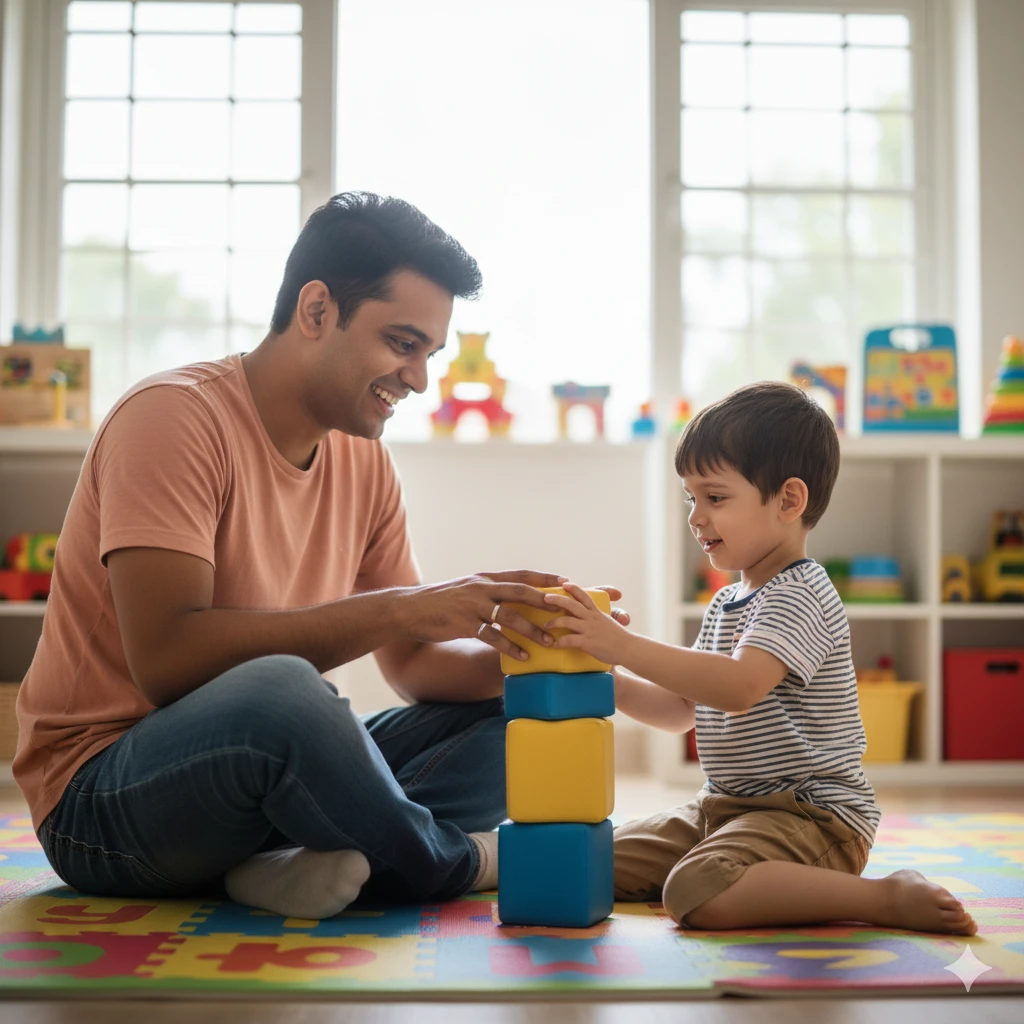As a parent of an autistic child, your primary goal is to connect with them on their level and help them navigate the world with confidence. While structured therapies are essential, many parents search for an approach that feels less like work and more like joyful interaction. What if the most powerful therapy tool was already in your home? What if it was simply the power of play?
This is the beautiful principle behind Floortime, a relationship-based therapy that puts connection and emotional development at the heart of a child’s growth. At Nirmal Hospital, we have seen firsthand how this approach can transform a child’s ability to relate, communicate, and think. This article will introduce you to Floortime and explain how it builds the essential foundations for lifelong learning and connection.
What Exactly is Floortime Therapy?
Floortime, also known as The DIR/Floortime® Model, is a therapeutic approach that involves getting on the floor with your child to engage with them through activities they genuinely enjoy. Unlike some therapies that are therapist-led, Floortime is child-led. The goal is to “follow your child’s lead” to understand their emotional world and help them expand their capacity for communication and connection.
The “DIR” in the name stands for:
- D – Developmental: The approach is tailored to the child’s current developmental stage, not their chronological age.
- I – Individual-Difference: It respects each child’s unique sensory profile, processing abilities, and neurological differences. This is crucial, as many children also navigate autism with co-occurring ADHD and anxiety.
- R – Relationship-Based: The learning and growth happen through the emotional connection between the child and their caregiver.
By meeting children in their world, we help them build the skills to participate in ours. It’s a foundational part of our autism spectrum disorder rehabilitation program in Mumbai.
How Floortime Builds Essential Skills
The magic of Floortime happens through a technique called “opening and closing circles of communication.” When your child shows interest in something (e.g., pushes a toy car), that’s an “opening.” When you respond by pushing a car back, you are building on their interest. When they respond back to you, a “circle” is closed. The goal is to engage in these back-and-forth interactions as long as possible.
This simple act builds critical skills:
- Shared Attention: It teaches a child to share focus on an activity with another person.
- Reciprocal Communication: It fosters the natural, back-and-forth flow of social interaction, both verbal and non-verbal.
- Emotional Regulation: By co-regulating with a calm and engaged parent, children learn to manage their emotions and sensory inputs, which can be a powerful tool for managing autism meltdowns.
- Problem-Solving and Abstract Thinking: As you gently challenge them within the play, you encourage them to think creatively and solve problems.
The Parent’s Role: Strengthening Your Bond
One of the most profound benefits of Floortime is its impact on the parent-child relationship. It empowers you, the parent, to become your child’s primary therapeutic partner. This can significantly reduce caregiver stress and build your confidence, a topic we discuss in our mental health guide for autism parents.
Instead of feeling like a taskmaster, you become a play partner. This process of deep, intentional play strengthens your bond and helps you understand your child’s motivations and feelings on a much deeper level, starting from the moment you begin understanding their signs and symptoms.
Floortime Therapy in Mumbai at Nirmal Hospital
So, what does this look like in practice? At Nirmal Hospital, our trained therapists don’t just “play” with your child. They use every moment of a Floortime session with intention. A typical approach involves:
- Observation: The therapist first observes your child’s natural interests and play style.
- Joining In: The therapist joins the child’s world, imitating their actions and following their lead to build trust and rapport.
- Expanding Play: Once a connection is established, the therapist gently introduces new ideas or challenges to encourage communication and creative thinking.
- Parent Coaching: A crucial component is coaching you, the parent. We teach you Floortime techniques so you can turn everyday moments at home into powerful therapeutic interactions.
This approach is a cornerstone of our specialised therapy for autistic children, designed to foster genuine growth from within.
Is Floortime Right for Your Child?
If you’re looking for a therapy that honours your child’s individuality and focuses on building a loving, interactive relationship, Floortime could be an excellent fit. It complements other therapies and provides a holistic foundation for social and emotional growth.
The journey of discovery is a partnership. By embracing the power of play, you can unlock your child’s potential and build a connection that will last a lifetime.
To learn more about Floortime and our comprehensive autism rehabilitation programs, we invite you to contact our team at Nirmal Hospital today.









Leave a Reply